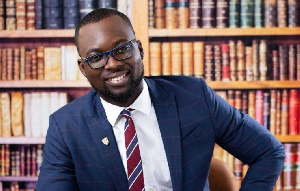Bobby Banson Advocates for Revised Constitution Enhancing Council of State’s Mediation Role in Political Stalemates
Lead Consultant at Robert Smith Law Group, Lawyer Bobby Banson, has called for constitutional reforms to empower Ghana’s Council of State in mediating key national issues, including political stalemates such as the recently resolved impasse in Parliament between the NDC and NPP caucuses over majority representation.
The scuffle between the two caucuses over who forms the majority side in Parliament followed the declaration of four seats belonging to members of the NPP Caucus vacant by the Speaker of Parliament, Alban Bagbin.
Speaking during the NorvanReports and Economic Governance Platform (EGP) X Space discussion titled Ghana’s Parliamentary Impasse: Impact on the Economy and Business Community, Lawyer Banson highlighted the need for the Council of State to assume a proactive and authoritative role in navigating disputes that would otherwise require judicial intervention.
“I think that what we may have to do going forward is to empower that Council of State, I have always contended that the Council of State should be given more powers under a new constitution where they would serve as a referee in certain situations that we may find ourselves,” Lawyer Banson proposed, suggesting that, with constitutional backing, the Council could act as a neutral arbiter by calling on top national figures—including the Speaker of Parliament, Chief Justice, and the President—to resolve matters diplomatically.
“If we have such a structure, some of these matters will not be allowed to get to this point,” he added.
Lawyer Banson also recommended changes to the Council’s composition to ensure it is not dominated by presidential appointees.
He advocated for representatives from Civil Society Organizations (CSOs) or professional bodies, suggesting an election process for members to foster impartiality and independence.
Reflecting on the broader implications of political and judicial power, Lawyer Banson remarked political and judicial power is supposed to be used for the benefit of the people because sovereignty resides in the people, urging leaders to remember the purpose of their roles and emphasizing that decisions must ultimately serve Ghana’s best interests.
Meanwhile, the Supreme Court has ruled, in a 5-2 majority decision, that Speaker Alban Bagbin’s declaration of four parliamentary seats as vacant was unconstitutional.
The ruling, issued on Tuesday, November 12, casts doubt on the Speaker’s authority over parliamentary membership decisions and could alter the balance of power within Ghana’s hung parliament, just weeks before a national election.
Chief Justice Gertrude Torkornoo presided over the brief session, noting that the detailed judgment and legal reasoning will be released on Wednesday, November 13.
“By a majority decision of five to two, with Lovelace Johnson JSC and Ahmadu Tanko JSC dissenting on jurisdictional grounds, the court upholds the plaintiff’s action,” the Chief Justice stated.








